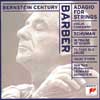Barber Orchestral Works
View record and artist detailsRecord and Artist Details
Composer or Director: William (Howard) Schuman, Samuel Barber
Genre:
Orchestral
Label: Classical
Magazine Review Date: 2/1998
Media Format: CD or Download
Media Runtime: 67
Mastering:
ADD
Catalogue Number: SMK63088

Tracks:
| Composition | Artist Credit |
|---|---|
| Adagio for Strings |
Samuel Barber, Composer
Leonard Bernstein, Conductor New York Philharmonic Orchestra Samuel Barber, Composer |
| Concerto for Violin and Orchestra |
Samuel Barber, Composer
Isaac Stern, Violin Leonard Bernstein, Conductor New York Philharmonic Orchestra Samuel Barber, Composer |
| To thee Old Cause |
William (Howard) Schuman, Composer
Harold Gomberg, Oboe Leonard Bernstein, Conductor New York Philharmonic Orchestra William (Howard) Schuman, Composer |
| In Praise of Shahn |
William (Howard) Schuman, Composer
Leonard Bernstein, Conductor New York Philharmonic Orchestra William (Howard) Schuman, Composer |
Composer or Director: Samuel Barber
Label: Theta
Magazine Review Date: 2/1998
Media Format: CD or Download
Media Runtime: 74
Mastering:
ADD
Catalogue Number: SMK60004

Tracks:
| Composition | Artist Credit |
|---|---|
| Concerto for Violin and Orchestra |
Samuel Barber, Composer
Isaac Stern, Violin Leonard Bernstein, Conductor New York Philharmonic Orchestra Samuel Barber, Composer |
| Concerto for Piano and Orchestra |
Samuel Barber, Composer
Cleveland Orchestra George Szell, Conductor John Browning, Piano Samuel Barber, Composer |
| Adagio for Strings |
Samuel Barber, Composer
Eugene Ormandy, Conductor Philadelphia Orchestra Samuel Barber, Composer |
| Essay for Orchestra No. 2 |
Samuel Barber, Composer
New York Philharmonic Orchestra Samuel Barber, Composer Thomas Schippers, Conductor |
| (The) School for Scandal Overture |
Samuel Barber, Composer
New York Philharmonic Orchestra Samuel Barber, Composer Thomas Schippers, Conductor |
Author: Edward Greenfield
The superb performance from Stern and Bernstein certainly makes up for the delay, for it can stand comparison with any version since, easily fluent in the two lyrical movements, demoniacally intense in the moto perpetuo finale. That movement, initially disappointing as a resolution to the first two, may not match the finales of the Walton and Britten in weight, but it certainly makes a powerful conclusion here. The only reservation is that with close-up CBS sound for the soloist you rarely get a true pianissimo.
Even more welcome, when it has long been unavailable, is John Browning’s premiere recording of the Piano Concerto. When his much more recent RCA version with Leonard Slatkin appeared, I went back to the original LP, and my comparisons this time have confirmed what was readily apparent then, that with Szell and the Cleveland Orchestra on searing form in 1964, this is an interpretation of the highest voltage, the more daring and bitingly intense for having been recorded after a long series of performances on tour, full of bravura, with recorded sound rather fuller and more clean than that of the Violin Concerto. The surprise is that though both these CBS recordings were made in 1964, within three months of each other, they were not designed as a coupling, partly, I imagine, a question of Szell and the Cleveland in those days recording for CBS’s semi-autonomous Epic division. Ormandy’s resonant recording of the Adagio, taken at a flowing speed, and Schippers’s dazzling, tautly controlled accounts of the Essay No. 2 and the Overture, also well transferred, make this an ideal disc for anyone wanting to investigate Barber at his finest.
The transfer of the Barber Violin Concerto in the Bernstein Century series is a shade more forward than the Theta one, with Bernstein’s view of the Adagio for strings much more expansive and heavily underlined than Ormandy’s, but with string tone again extremely beautiful. The two William Schuman works are both elegiac, darkly intense in his baldest style. Scored for oboe, brass, timpani, piano and strings, To thee Old Cause was written in the wake of the assassinations of Martin Luther King and Robert Kennedy in 1968. With its block chords and measured build-up it has something of the rugged strength of Stravinsky’s Symphonies of Wind Instruments. In Praise of Shahn, dating from the following year, is a response to the painting of Ben Shahn who had just died, similarly dark and brutal with aggressive brass, until the second movement brings an energetic conclusion, where Schuman with jabbing syncopations unleashes all the violence that he has kept in check till then – a powerful resolution. Bernstein in both works is the ideal interpreter, always at his most inspired with elegiac themes.'
Discover the world's largest classical music catalogue with Presto Music.

Gramophone Digital Club
- Digital Edition
- Digital Archive
- Reviews Database
- Full website access
From £8.75 / month
Subscribe
Gramophone Full Club
- Print Edition
- Digital Edition
- Digital Archive
- Reviews Database
- Full website access
From £11.00 / month
Subscribe
If you are a library, university or other organisation that would be interested in an institutional subscription to Gramophone please click here for further information.





